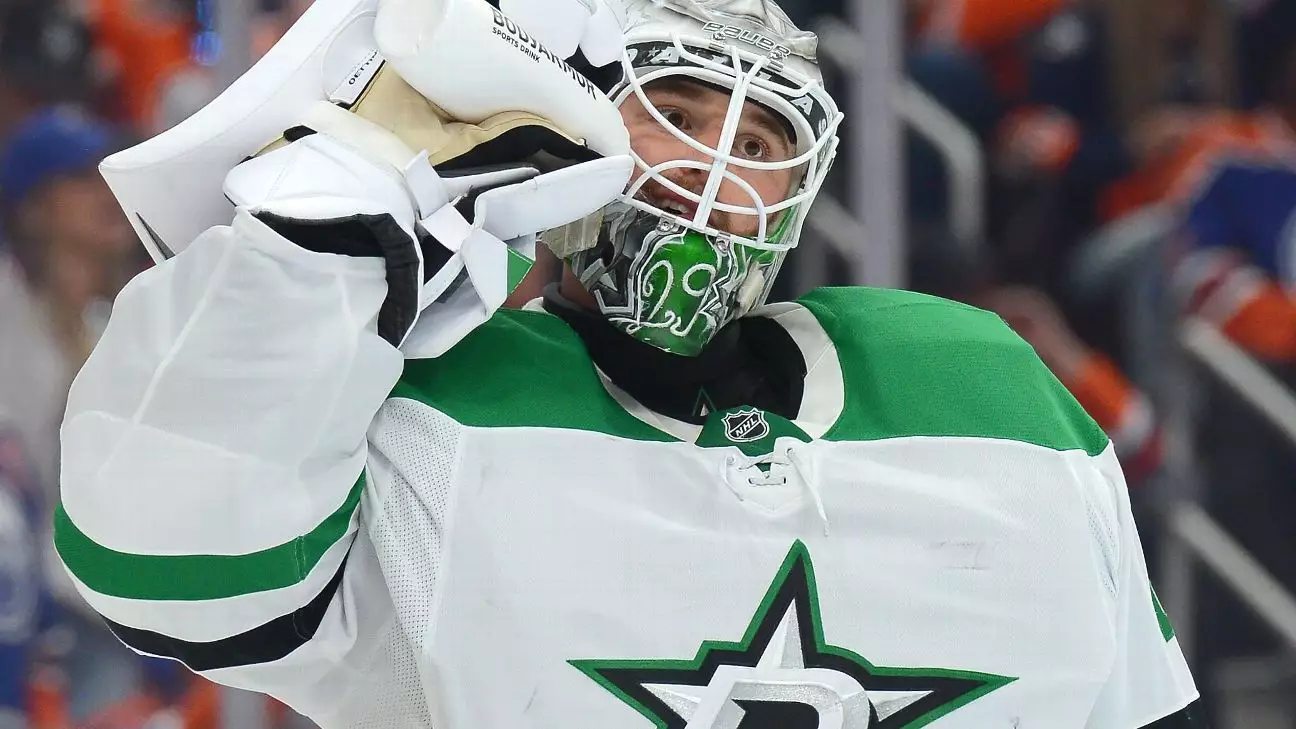In a gripping and tumultuous postseason for the Dallas Stars, the abrupt removal of goaltender Jake Oettinger from Game 5 of the Western Conference finals has ignited discussions and debates that go beyond mere statistics. Coming off a regular season filled with promise and fierce determination, Oettinger found himself at the center of controversy after allowing two goals in rapid succession, leading to a puzzling decision from head coach Peter DeBoer. This not only put a spotlight on the young goalkeeper but also raised questions about decision-making under pressure. The Stars’ inability to advance past the Edmonton Oilers for the third consecutive year highlighted not just a battle against an opponent, but also the internal struggles of the team and its players.
The Weight of Expectations
Oettinger’s candid remarks following his unexpected exit speak volumes about the mental burden placed upon athletes at the pinnacle of their professions. The 26-year-old’s assertion that he needed to analyze his gameplay critically reveals a maturity uncommon in young players. He mentioned, “The reality is if I make one or two of those saves, then I’m still playing in the game.” Such reflections are not just about personal performance but touch upon the delicate balance between self-critique and accountability. Athletes often grapple with these dual pressures; Oettinger’s realization that improvement stems from adversity is a testament to his growth mindset, a quality vital for success in high-stakes environments.
The Coach’s Dilemma
Coach Peter DeBoer’s decision to pull Oettinger has received mixed reviews, stirring the conversation about coaching strategies and the psychology behind them. Coaches are frequently faced with the challenge of making split-second decisions that can alter the course of a game—and in this case, the season. DeBoer’s comments suggest he acted not only from a tactical standpoint but also with a sense of urgency; he knew his team needed a jolt to turn the tide against a formidable opponent. His admission that he wished to “stop the bleeding” during a critical game underscores the high-stakes nature of coaching in the playoffs. Yet, the decision also left him accountable to a young talent facing the pressures of postseason expectations.
The Statistics Behind the Struggle
While the focus may have shifted from the individual to the broader narrative, statistical insights paint a clearer picture of Oettinger’s capabilities. With a .905 save percentage and 2.82 goals-against average across 18 playoff games, Oettinger has proven himself capable of handling heavy shots, making him a standout among his peers. Comparatively, he faced 503 shots—far more than any other goaltender in the playoffs—showing not only his resilience but also the reliance of the Stars’ defensive strategy on his performance. Grace under pressure and consistent execution are key traits for any elite athlete, and Oettinger has demonstrated a formidable ability to thrive in these conditions, despite the setbacks he’s faced.
Dealing with Fatigue and Expectations
As athletes strive to push their limits, the mental and physical toll of a competitive season cannot be overstated. Oettinger, while expressing he felt “the healthiest he’s ever felt,” acknowledged the intense psychological demands that accompany an extended playoff run. Dealing with upper respiratory issues during a high-pressure series speaks to the burdens a goaltender must bear behind the scenes—an aspect often glossed over in favor of on-ice heroics. The interplay of fatigue—both physical and mental—remains an underappreciated factor that can heavily influence performance. Oettinger’s thoughtful approach reveals an astute understanding that mental fortitude is critical for long-term success in sports.
Looking Ahead
Oettinger remains determined to evolve as a player following this season’s challenges. His reflection that every experience—good or bad—plays a part in shaping who he is as both a player and a person shows a level of emotional intelligence rarely seen in athletes. While many may focus on immediate outcomes, Oettinger’s commitment to self-improvement embodies the relentless pursuit of excellence that defines champions. Athletes must often learn to channel disappointments into motivation, and Oettinger appears poised to do just that, looking toward future seasons with renewed vigor and determination.
In a league characterized by fierce competition and volatile emotions, Oettinger’s journey serves as a powerful reminder of the importance of resilience, reflection, and growth. The questions surrounding Edmonton’s playoff performance are merely a launching pad for a young goaltender who appears ready to rise again, armed with valuable lessons from his experiences.


Leave a Reply